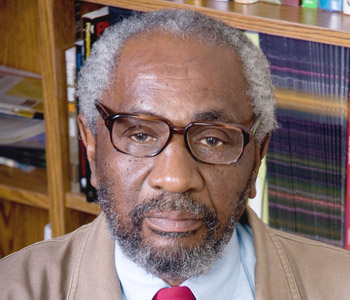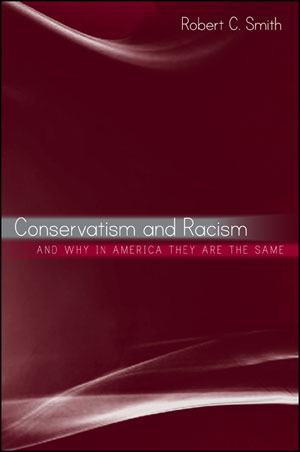
In this book I systematically demonstrate the inescapable racism inherent in American conservatism. The argument unfolds in layers.
First, I show that ideological conservatism is everywhere and always the conscious and reflective defense of established institutions and ways of life.
In the United States this has meant a defense of racism and white supremacy. The first conscious conservative movement in America emerged in the South partly as a reaction to the movement to abolish slavery, and the modern conservative movement in America is rooted partly in opposition to the Civil Rights Movement.
Second, the substantive ideals of American conservatism—limited government, states’ rights, individualism, property rights, and the prioritizing of liberty over equality—when applied consistently inevitably result in racism.
Third, I show that the ascendancy of the conservative movement to national power with the election of Ronald Reagan was partly based on the Republican Party’s “Southern Strategy” of exploiting racist and white supremacist sentiments in the electorate beginning with the election of 1964.
I am acutely aware that the argument will strike many Americans—and not just conservatives—as outrageous. Therefore, I approached the analysis and writing with unusual care. I spend the entire first chapter defining the terms of the discourse—conservatism, racism and white supremacy. The remaining chapters are thoroughly referenced and documented. By design, the book combines philosophy, history and political science.
“The public, politicians and the media are often puzzled by the consistent failure of conservatism to have much appeal to African Americans. This book provides the answer to those puzzles.”
This is first a book about ideas and how they can have consequences in politics, if they are linked to powerful, well-financed movements.
I excavate the ideas on race of the leading conservative and neoconservative intellectuals from the 1950s to the 1980s. The ideas examined, among others, are those of Russell Kirk, William F. Buckley, Jr., James J. Kilpatrick, Milton Friedman, Robert Bork, Irving Kristol, Edward Banfield, Nathan Glazer and Aaron Wildavsky. These ideas helped to shape the presidential campaigns of Barry Goldwater and Ronald Reagan, the two leading conservative statesmen of the modern era.
For example, Bork, the conservative movement’s leading jurisprudential scholar, objected to the Civil Rights Act of 1964. He described the landmark legislation as “unsurpassed ugliness” because, Bork argued, the core principles at stake in any civil rights law are individual liberty and property rights; it was the freedom of individuals to do with their property as they wished, even if they wished to deny access to a BBQ joint or motel to other individuals because they were black.
Similarly, Friedman, the movement’s apostle of unfettered, free market capitalism, compared the equal employment title of the 1964 Act to “Hitler Nuremburg laws” because “such legislation clearly involves interference with the freedom of individuals to enter into voluntary contracts with one another.”
The book includes detailed study of the Reagan presidency and race related issues. Using archival material from the Reagan presidential library, I focus on affirmative action, the Voting Rights Act, the Grove City case, welfare reform, South Africa policy, and the Martin Luther King, Jr. holiday. I conclude the book by showing how the conservative movement and the Reagan presidency have had an enduring impact on presidential elections, the presidency, the Democratic Party, racial liberalism and the continuing struggle for a more racially just society.
A section of Chapter 8 on the ascendancy of Reagan to the presidency is titled “It’s the Ideology, Stupid.” President Reagan is a central character in the book, because he is undoubtedly the most significant conservative leader of the present era and one of the most significant in American history.
Reagan was frequently accused of being a racist. Nothing angered him more. As he writes in his presidential memoir “the myth that has always bothered me the most is that I am a bigot who somehow surreptitiously condones racial prejudice… Whatever the reason for this myth that I am a racist, I blow up every time I hear it.”
In close, careful study of the biographical and historical records, I found no evidence that Reagan was a racist or white supremacist. It was Reagan’s principled, ideological conservatism that led him to oppose every civil rights bill enacted in the 1960s.
Reagan’s opposition to the Civil rights Act of 1964 and the Voting Rights Act of 1965 was based on the conservative principles of limited government and states’ rights. In California he opposed the state’s Fair Housing Act on the conservative principles of individualism and property rights, declaiming that the right of an individual to dispose of his property as he wished was “a basic human right.”
Reagan prioritized these conservative ideological principles over the human rights of African Americans to be served at a Georgia BBQ joint, to vote for president in Alabama or to purchase a house in California. In doing so, he clearly made conservatism and racism the same.
As if to symbolize this relationship, Reagan’s first campaign appearance after he received the Republican nomination in 1980 was in Philadelphia, Mississippi. Philadelphia was the site of the 1964 murder of three civil rights workers by the Ku Klux Klan. In his Philadelphia speech Reagan invoked states rights, code words in the South for the right of whites to oppress blacks.
“In close, careful study of the biographical and historical records, I found no evidence that Reagan was a racist or white supremacist. It was Reagan’s principled, ideological conservatism that led him to oppose every civil rights bill enacted in the 1960s.”
The public, politicians and the media are often puzzled by the consistent failure of conservatism to have much appeal to African Americans. This book provides the answer to those puzzles.
I decided to write the book shortly after Ronald Reagan’s funeral. In the long lines of mourners that gathered to pay their respects to the President at the Capitol in Washington and the presidential library in Simi Valley, California there were very few African Americans.
In the course of the nearly week long commemoration of Reagan’s life and legacy—where he was lauded as one of the nation’s greatest presidents—I was asked in the media to explain the absence of black mourners in Washington and Simi Valley. My explanations dealt less with Reagan as an individual or as president than with conservatism as a philosophy and ideology.
Ronald Reagan was not mourned by many African Americans because he was a conservative; the most successful conservative president of the post civil rights era and one of the most successful conservative presidents in the 20th century. Conservatism as a philosophy and ideology, I explained, are and always have been hostile to the aspirations of Africans in America; incompatible with their struggle for freedom and equality. Thus, very few blacks could mourn the passing of a man who was an icon in the cause of 20th century American conservatism.
In the nature of modern media it was difficult to convey this rather complex idea in a brief interview. I found that even in extended interviews it was difficult to fully explore this complex relationship between conservatism and black aspirations.
Repeatedly, I was asked: Are you saying that conservatism is racism? That all conservatives are racist? Aren’t there black conservatives? Are they racist? Are the millions of Americans who supported President Reagan racist? Are President George W. Bush and the conservatives who control the Congress and the courts hostile to African American interests?
My answer to most of these questions was a qualified yes. But the many qualifications and caveats left me, the interviewers, and the audience, without the kind of clarity one would hope for when professors are called upon to explain complex issues to the public. Thus, this book.


Robert C. Smith is professor of Political Science at San Francisco State University. He received his undergraduate degree from UC Berkeley and his graduate degrees from UCLA and Howard University. Besides Conservatism and Racism and Why in America They Are the Same, Smith is also the author of the Encyclopedia of African-American Politics, scores of articles and essays, a dozen books, and the just-completed manuscript The Politics of Ethnic Incorporation and Avoidance: The Elections and Presidencies of John F. Kennedy and Barack Obama. In 1998 he was awarded Howard University’s Distinguished Ph.D. Alumni Award.